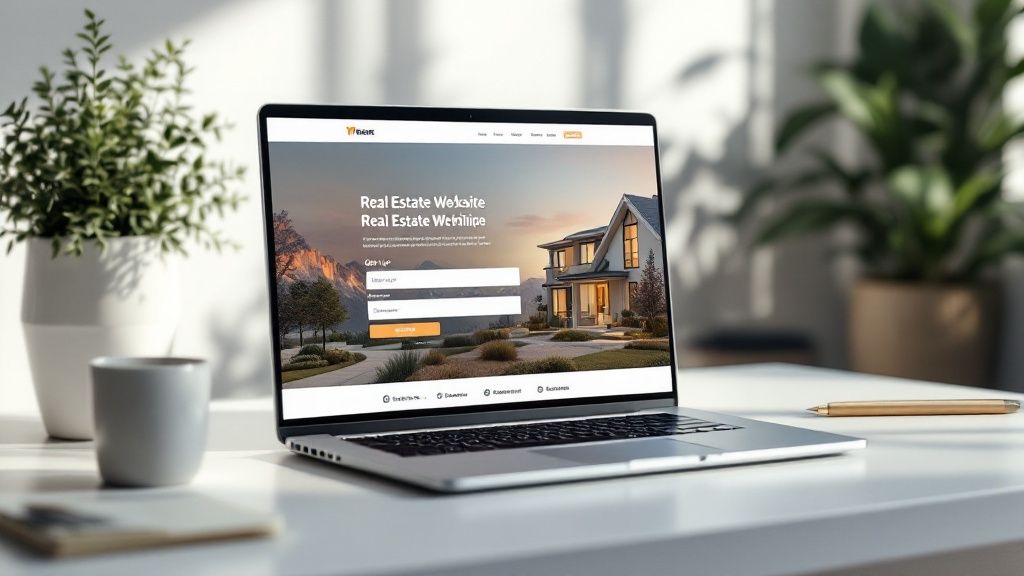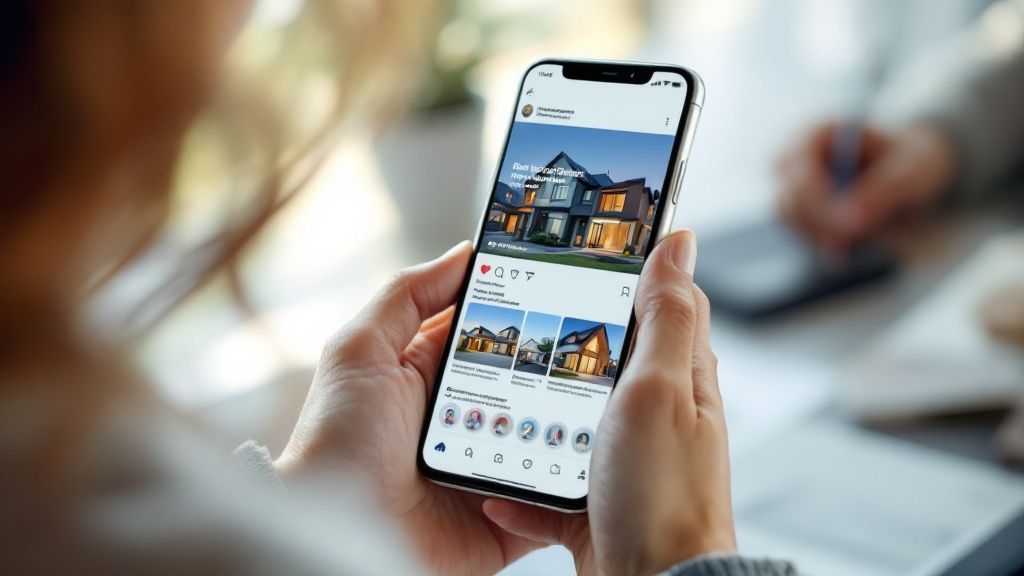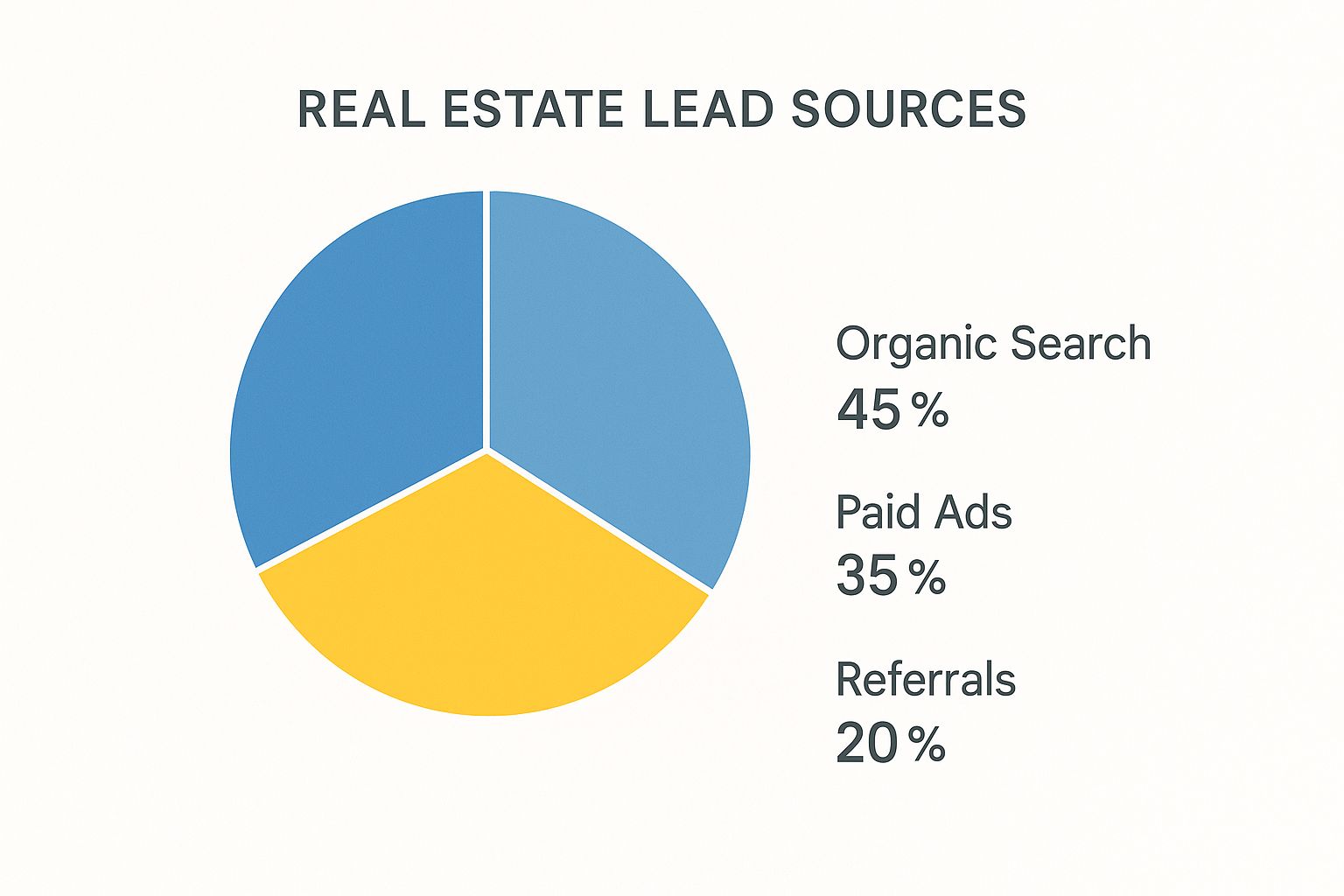When we talk about online lead generation in real estate, we’re really talking about using your website, social media, and online ads to find and connect with potential buyers and sellers. It’s all about meeting clients where they’re already spending their time—online—and building a reliable pipeline of new business. For any modern agent, this isn't just a nice-to-have; it's absolutely essential.
Why Your Digital Presence Is Your Most Valuable Listing

The way people buy and sell homes in Australia has completely changed. The days of relying on a "For Sale" sign and an ad in the local paper are long gone. Today, the first open house almost always happens on a screen, which makes online lead generation for real estate the foundation of any successful agency.
Put yourself in your client's shoes for a moment. When someone decides it's time to move, their first move isn't to call an agent—it's to open their web browser. They're searching for "homes for sale in [suburb]," "best real estate agents near me," or "how much is my house worth?" Being visible in those search results is the modern-day equivalent of having the best shopfront on the busiest high street.
The Modern Client Journey Starts Online
This shift to digital isn't just some passing trend; it's a fundamental change in how people behave. In Australia, a massive 92% of property searches now kick off online. That single statistic shows the incredible opportunity waiting for agents who invest in a solid digital footprint.
Your potential clients are already online, actively searching for the exact expertise you offer. But the journey doesn't stop with a simple search. They’re looking for signs that they can trust you. They want to see a professional website, read insightful blog posts about the local market, and check out your online reviews. Every single one of these digital touchpoints helps shape their decision.
Your online presence is the hardest-working member of your team, working for you 24/7. It's your digital business card, your portfolio, and your lead-capture machine all rolled into one, building your credibility even while you sleep.
Building Trust Before the First Handshake
At the end of the day, a strong digital presence establishes your authority long before a potential client even thinks about picking up the phone. It gives you a platform to provide real value upfront through helpful content, showcasing your local market knowledge and expertise.
A strong brand combined with positive online feedback is crucial here. Understanding how to build and protect that reputation is vital for long-term success. You can check out our guide on reputation management services to learn how to cultivate that trustworthy online identity.
This foundation of trust is what converts a casual online browser into a serious, high-intent lead. By meeting clients where they are and offering genuine solutions to their problems, you grab their attention—and their business—before your competitors even know they're in the market.
Building Your Digital Shopfront to Capture Leads

Think of your website as more than just an online brochure. It should be your hardest-working employee, capturing leads around the clock. A solid strategy for online lead generation in real estate starts by turning your site from a passive billboard into an active, lead-pulling machine. This means going beyond pretty photos and focusing on the core elements that turn casual visitors into serious enquiries.
First things first, your site has to work flawlessly on a phone. The vast majority of initial property searches happen on mobile devices, so a clunky mobile experience is a non-starter. Combine that with simple, intuitive navigation that makes finding listings and information a breeze. Finally, sprinkle clear, compelling calls-to-action (CTAs) on every page, guiding visitors naturally towards that next step—whether it's booking a viewing, downloading a guide, or just getting in touch.
Become the Go-To Local Expert
To pull in high-quality organic traffic, your content needs to scream local. Forget generic blog posts. It's time to create hyperlocal resources that buyers and sellers in your specific patch are actually searching for.
This is how you position yourself as the undisputed local authority. For example, you could put together:
- In-depth Neighbourhood Guides: Go deep on local schools, parks, the best coffee spots, and transport links.
- Local Market Analyses: Offer quarterly updates on property values and trends in specific postcodes.
- Relocation Resources: Create handy checklists and guides for people moving into your area from out of town.
When you provide genuine value that’s specific to your community, you build trust and attract an audience that is incredibly relevant to your business. The result? When they’re ready to make a move, you’re the first person they think of.
Your website's goal isn't just to display listings. It's to answer every potential question a local buyer or seller might have, proving your value long before they ever pick up the phone.
Optimise Your Local Search Footprint
Your Google Business Profile (GBP) is a massive piece of your digital shopfront. A fully optimised profile is your ticket to appearing in the highly visible Google "map pack" when someone searches for agents in your area. Honestly, it's one of the best ways to turn casual searchers into direct, high-intent leads.
Make sure your GBP is complete with high-quality photos, consistent business hours, your correct address, and a direct phone number. Actively encourage happy clients to leave reviews, because that positive social proof is gold for attracting new leads. It’s also crucial to respond to every review—good or bad—as it shows you’re professional and engaged. A key part of building an effective online presence involves dialling in your local search strategy. To make sure your digital shopfront is truly capturing leads from your specific area, you should run through this detailed local SEO checklist.
Juggling all these digital touchpoints is key, and having the right tools makes a world of difference. To help streamline client communications and ensure no lead ever slips through the cracks, it might be worth exploring some of the best apps for real estate agents built to make your life easier.
Using Social Media to Build Relationships and Generate Leads
Just slinging a "Just Listed" graphic onto your social media feed is a start, but let's be honest—it's not a real strategy. The secret to proper online lead generation in real estate is to stop broadcasting and start building a genuine community. The aim is to create a personal brand that people are actually drawn to, so when they’re finally ready to buy or sell, you’re the first agent they think of.
Forget trying to be everywhere at once. That's a surefire way to burn out. Instead, focus your energy on the platforms where your ideal clients are already hanging out and create content that speaks their language. This is how you build real connections and get authentic conversations flowing—the bedrock of turning followers into future clients.
Platform-Specific Strategies That Actually Work
Every social media platform has its own vibe and expectations. A one-size-fits-all approach just doesn't cut it and will fall flat, fast. You've got to play to the unique strengths of each channel to really make an impact.
Here are a few practical ideas tailored for the Australian property market:
- Instagram Reels for Property Tours: Ditch the boring photo slideshows. Create short, punchy video tours of new listings. Throw in some trending audio and quick text callouts to highlight the best bits, like a freshly renovated kitchen or a killer backyard view. These videos are incredibly shareable and give a property a dynamic feel that static photos can't match.
- Facebook Groups for Community Leadership: Start a local Facebook group for your patch, something like the "New Lambton Community Hub." Don't just post about real estate. Share news about local events, new cafe openings, and council updates. By becoming a go-to local resource, you build trust and stay top-of-mind without ever feeling like you're selling.
- LinkedIn for High-Value Connections: LinkedIn is your tool for connecting with local business owners, investors, and high-net-worth individuals. Share market analysis and your insights on commercial property trends. This positions you as a knowledgeable industry authority, not just another residential agent.
Not all social platforms are created equal when it comes to real estate. The key is matching the right content to the right audience to achieve your lead generation goals.
Effective Social Media Content by Platform for Real Estate Agents
| Platform | Recommended Content | Primary Goal | Audience Focus |
|---|---|---|---|
| High-quality property photos, Reels (tours, tips), Stories (behind-the-scenes), local lifestyle content. | Brand building, visual showcase, engaging younger demographics. | First-home buyers, lifestyle-focused clients, design enthusiasts. | |
| Community group engagement, local event promotion, detailed listing posts, client testimonials, live Q&As. | Community building, lead nurturing, generating referrals. | Local families, community-minded individuals, past clients. | |
| Market analysis, investment insights, commercial property trends, professional networking articles. | Establishing authority, B2B networking, connecting with investors. | Investors, business owners, high-net-worth individuals, corporate clients. | |
| TikTok | Quick property tours, suburb highlights, myth-busting videos, "day in the life" content. | Brand awareness, reaching a broad and younger audience. | Renters, first-time buyers, Gen Z and younger Millennials. |
Ultimately, choosing the right platform and content type comes down to knowing exactly who you're trying to reach and what you want to achieve.
The pie chart below really drives home just how critical a smart digital strategy is for today's agents.

This data shows that a solid online presence, powered by a mix of organic search and paid ads, is where the lion's share of leads are coming from now.
Fostering Conversations and Providing Value
The real secret to winning on social media is to switch your mindset from selling to serving. Every single post should offer some kind of value and be designed to start a conversation. So, instead of just dropping a link to a new listing, ask a question. Something like, "What's your favourite feature of this home's outdoor entertaining area?" works wonders.
The most powerful lead generation tool on social media isn't a clever ad; it's an authentic conversation. People do business with agents they know, like, and trust—and that trust is built one genuine interaction at a time.
And this isn't just fluffy advice; the numbers back it up. In Australia, agents who are active and engaging on social platforms close 30–40% more leads than their quieter counterparts. When it comes to connecting with investors or commercial clients, LinkedIn is a powerhouse—it’s reportedly 277% more effective than other platforms for this purpose.
You can dig into more stats about how much social media really moves the needle by checking out these findings on real estate social media effectiveness. When you make relationship-building your priority, you create a loyal following that doesn't just like your posts, but turns to you first when it's time to make a move.
Targeting High-Intent Clients with Paid Advertising

While organic strategies like SEO and social media are your long game, sometimes you just need to get in front of the right people right now. This is where a smart, targeted paid advertising strategy for online lead generation in real estate becomes a total game-changer.
It’s all about showing up at the exact moment a potential client is actively looking for what you offer. We're not talking about boosting a post and hoping for the best. This is a deliberate approach to snagging qualified leads who are much further down the road in their decision-making process.
Winning with Google Ads
Think about it. When you need something specific, where do you go? Straight to Google. Your future clients are doing the exact same thing, typing in phrases like "real estate agents in Paddington" or "four-bedroom homes for sale in Richmond."
With Google Ads, you can bid on these exact keywords, making sure your agency pops up at the very top of their search results. This is incredibly powerful because you’re meeting people who have already put their hands up and declared their intent.
A winning campaign is all about being hyper-local. Don’t spread your budget thin. Instead, focus on a few key postcodes where you have deep market knowledge. Then, craft ad copy that speaks directly to the needs of buyers or sellers in that specific area.
For instance, an ad headline like "Top Agent in Surry Hills – Free Property Appraisal" can work wonders, especially when it links to a dedicated landing page built to capture their details.
Reaching Untapped Audiences with Facebook and Instagram
If Google Ads is about capturing active searchers, platforms like Facebook and Instagram are about finding potential clients before they even realise they're looking. The targeting options here are ridiculously detailed, letting you build custom audiences based on life events, behaviours, and interests.
You can get super specific with campaigns that target users based on things like:
- Life Events: Think "recently engaged" or "newly married," which are often triggers for buying a first home.
- Behavioural Indicators: Targeting people who have shown interest in property portals like Domain or realestate.com.au.
- Demographics: Focusing on specific age ranges and income brackets that match your ideal client profile.
Paid advertising isn't an expense; it's a direct investment in a predictable and scalable lead flow. By measuring your Return on Investment (ROI) closely, you can fine-tune your campaigns to ensure every dollar you spend is actively growing your business.
A great ad on social media often tells a story. Use high-quality video walkthroughs of a new listing or run a carousel ad showcasing a property's best features. The goal here is to stop the scroll with eye-catching creative and a crystal-clear call-to-action, like "Download Our First-Home Buyer's Guide" or "See More Photos of This Stunning Home."
By combining the intent-driven power of Google with the audience-building muscle of social media, you create a seriously powerful, multi-channel approach to lead generation that brings clients to your door.
Turning Leads Into Clients with Smart Nurturing
Getting a new enquiry in your inbox is a great feeling, but let's be real—that’s just the starting line. The real magic in online lead generation for real estate happens in the follow-up. Turning that initial flicker of interest into a signed agreement takes a smart, consistent nurturing process that builds trust and proves your worth over time.
This is exactly where so many agents drop the ball. A lead who feels ignored will bounce to the next agent who actually responds. In real estate, timing isn't just important; it's pretty much everything. The whole concept of 'speed-to-lead' is a genuine game-changer, because your chance of converting that online enquiry plummets with every single minute that ticks by.
The Power of Prompt and Personalised Follow-Up
The stats on follow-up speed are seriously eye-opening. Analysis from the Aussie real estate scene shows that leads contacted within five minutes are a whopping nine times more likely to convert. That one statistic alone shows why having an organised system isn't just a 'nice-to-have'—it's non-negotiable. You can dig into more data on how timing impacts real estate lead conversion statistics if you're curious.
To pull this off, a simple Customer Relationship Management (CRM) system is your new best friend. A good CRM can automate your initial follow-ups, making sure every new lead gets an immediate, professional response, even if you’re tied up in a client meeting.
It also keeps all your contacts neatly organised. You can track conversations and set reminders so no opportunity ever slips through the cracks. This systematic approach is the bedrock for growing your business without losing that all-important personal touch.
Nurturing isn't about pestering someone until they give in. It's about providing consistent value so that when they're finally ready to make a move, you're the only person they think of calling.
Crafting an Effective Email Nurture Sequence
Once you’ve made that first quick contact, the real nurturing begins. An automated email sequence is a brilliant way to stay top-of-mind and build rapport without chaining yourself to your keyboard writing individual emails all day. Your sequence should be a solid mix of helpful info and subtle reminders of your expertise.
A solid nurture sequence could look something like this:
- A Warm Welcome: Your first email should be simple. Thank them for their enquiry and let them know what to expect from you.
- Hyperlocal Market Insights: Send them a link to a recent blog post or a quick video you shot about property trends in the specific suburb they’re interested in.
- Helpful Resources: Offer them something genuinely useful, like a free downloadable "First-Home Buyer's Checklist" or a "Seller's Guide to Staging."
- Client Success Stories: Nothing builds trust like social proof. Share a brief testimonial or case study from a happy client in their area.
The trick is to personalise this communication at scale. Use your CRM to segment your leads—think buyers vs. sellers, for example—so the content they get is always super relevant to what they need. Building out a solid process for this is key, and you can learn more by checking out our deep dive into creating a real estate follow-up system.
By delivering real, undeniable value at every touchpoint, you massively increase your chances of turning that initial online click into a loyal, long-term client.
Got Questions About Real Estate Lead Generation?
Diving into the world of online lead generation for real estate can feel like a bit of a minefield. It’s easy to get overwhelmed by all the options out there, especially when you’re trying to spend your time and money wisely.
Let's cut through the noise and tackle some of the most common questions agents have when they’re trying to get their online strategy off the ground.
How Much Should I Actually Budget for Digital Marketing?
Look, there’s no magic number here. But a solid starting point is to earmark about 10% of your Gross Commission Income (GCI) goal for your marketing efforts.
So, if you’re aiming for a $100,000 GCI this year, you’d be looking at a marketing budget of around $10,000. That’s not just for ads, by the way. This bucket of money covers everything from your website hosting and CRM software to those targeted social media campaigns.
The best budget isn't a set-and-forget figure; it's a living, breathing thing. My advice? Start on the smaller side, track your results like a hawk, and then pour more fuel on the fire for whatever channels are actually bringing in qualified leads.
I'm a New Agent. What Are the Best Channels to Start With?
When you're just starting out, the name of the game is focus. Don't try to be everywhere at once – you'll just spread yourself too thin and get frustrated.
The goal is to build a long-term foundation while drumming up some immediate interest. The best way to do that is to pick two or three core channels and really master them. You’ll build momentum and see real results so much faster.
For a new agent, a killer starting combo usually looks something like this:
- A Hyperlocal Blog: This is your home base. Writing articles that answer super-specific questions about your local area (think "Best Suburbs for Young Families in Newcastle") is a fantastic way to pull in organic search traffic and position yourself as the local expert.
- A Niche Facebook Group: Don't just make another boring business page. Create a genuine community group centred around your local area. When you become a valuable resource instead of just a salesperson, you build trust and stay top-of-mind.
- Targeted Facebook Ads: You don't need a massive budget to make an impact. Run a few simple ads promoting a free home valuation tool or a downloadable buyer's guide, but make sure you target it specifically to your key postcodes.
How Do I Know If My Campaigns Are Actually Working?
It's easy to get distracted by "vanity metrics" like likes, shares, or impressions. They might feel good, but they don't pay the bills. To really figure out if your online lead generation is successful, you need to track the numbers that directly affect your bottom line.
You should be obsessed with these three Key Performance Indicators (KPIs):
- Cost Per Lead (CPL): Simple, but crucial. How much money are you spending to get one new lead in the door?
- Lead-to-Appointment Rate: What percentage of those online leads are actually turning into a face-to-face (or virtual) meeting?
- Lead-to-Closing Rate: This is the big one. At the end of the day, what percentage of your online leads become a closed deal?
Tracking these figures tells you exactly which campaigns are making you money and which ones are just wasting it. And for those really looking for an edge, it's worth exploring how to leverage AI for lead generation, as it can help automate this tracking and add a whole new level of personalisation to your outreach.
At OnSilent, we help you capture every opportunity without letting calls derail your day. See how our AI Call Assistant can ensure you never miss a valuable lead again by visiting https://onsilent.com.

